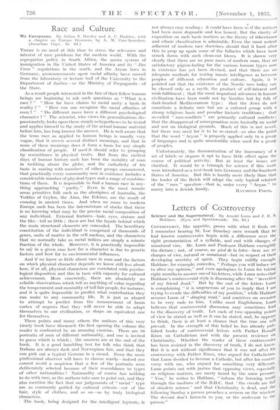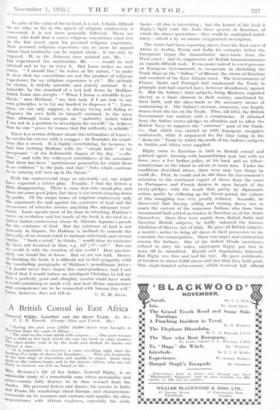Letters of Controversy
Science and the Supernatural. By Arnold Lunn and J. B. S. Haldane. (Eyre and Spottiswoode. 10s. 6d.) CONTROVERSY, like appetite, grows with what it feeds on. I remember hearing St. Loe Strachey once remark that ha had known controversies begin with a difference over the right pronunciation of a syllable, and end with charges of unnatural vice. Mr. Lunn and Professor Haldane exemplify the dictum. ; not, of course, an pied de la kitre—here arc ae charges or vice, natural or unnatural—but in respect 01 the developing acerbity of spirit. „ They begin mildly enough. Haldane, for example, concedes, " Perhaps you will induce me to alter my opinion," and even apologises to Lunn for taking eight months to answer one of his letters, while Lunn notes that Haldane's controversial style, is disarming after the " invective of my friend Joad." But by the end of the letters Lunn is complaining " it is ungenerous of you to imply that I am trying to evade the difficulties of my position," while Haldane accuses Lunn of " slinging mud," and contrives on occasion to be very rude to him. Unlike most Englishmen, Lunn believes that controversial discussion may sometimes lead to the discovery of truth. Let each of two' opposing points of view be stated as well as it can be stated, and, he, appears to think, there is at least a chance that the true :one Will prevail. In the strength of this belief he has already pub- lished books of controversial letters with Father Ronald Knox on Catholicism and with the present 'reviewer on Christianity. Whether the 'reader of these controversies has been assisted in the discovery of truth, I do not knoll'" But it is not without significance that it was not after iii° controversy with Father Knox, who argued for Catholicisim that Lunn decided to become a Catholic, but after his contre' versy with me; who argued for something very different. Lunn points out with justice that opposing views, especiallY on religious matters, are rarely heard by the same persons° " You," he writes to Haldane, "-inform the listening work' through the medium of the B.B.C. that the creeds are foil of obsolete science ' and that Christianity is dead, and the following Sunday a parson preaches a sermon on the wireless. The devout don't listen-in to you, or the undevout to the ,parson." In spite of the value of the method, it is not, I think, difficult to see why, so far as the sphere of religious controversy is concerned, it is not more generally followed. There arc many who hold that a man's religious convictions must rest in the last resort upon his personal religious experience. Now personal religious experience can no more be argued about than toothache can be argued about ; it can only be enjoyed. If, as Dr. Johnson once pointed out, Mr. has experienced the unutterable, Mr. ---- would be well advised not to try to utter it. But Lunn makes no such claim,.`, I should like," he writes at the outset, " to make • it clear that my convictions arc not the product of religious experience, for my religious experience is nil." His attitude 'he claims, is strictly scientific and strictly rational. • It is scientific, by the standard of a test laid down by Haldane Which Lunn also accepts—" When I frame a scientific hypo- thesis," says Haldane, " my first task, if I am true to my own principles, is to try my hardest to disprove it " ; Lunn, then, we can only suppose, is always trying and failing to disprove his own faith to himself—rational, in the sense that, although Lunn accepts on " authority beliefs which I am not in a position to investigate for myself," he believes that he can " prove by reason that the authority is reliable."
There is a certain defiance about this rationalism of Lunn's ; he carries his science with a swagger ; he flourishes his scepti- cism like a sword. It is highly entertaining, for instance, to find him twitting Haldane with the " simple faith " of his acceptance " of the fashionable dogma. of the day, ' evolu- tion'," and with the mild-eyed trustfulness of his assurance that there has been " spontaneous generation for which there is no evidence " in the paSt, and that " links which continue to be missing will turn up in the future."
With the controversial stage so admirably set, one might have expected a better play. Frankly, I find the letters a little disappointing. There is some first-rate sword-play and there are some good jokes, but there is too much straying down by-paths. Of the major issues of religious controversy only the arguments for and against the existence of God and the occurrence of miracles receive anything like adequate treat- Mein. Lunn spends most of his time in attacking Haldane's views on evolution and too much. of the book is devoted to a rather barren controversy about St. Thomas Aquinas's proofs for the' existence of God. But the existence of God is not seriously in dispute, for Haldane is inclined, to concede the necessity of an' eternal mind to harbour 'universals and eternal truths. " Such a mind," he thinks, " would shoW its eicistence by facts not localised In time; e.g., 122+52=182.,, But can lve credit it with the Creation of this. world ? How' passion- ately .one''wOnld like to know. Bid, we are' not told. Hence, On finishing the book, it is difficult not to feel sympathy with the concluding paragraphs of Haldane's penultimate letter : I should never have begun this correspondence, had I not hoped that I would induce an intelligent Christian to tell me hOw a perfectly good and almighty creator could have made a world containing so much evil, and how divine omniscience .aOd omnipotence are to be 'reconciled with huMan free will."



























































 Previous page
Previous page